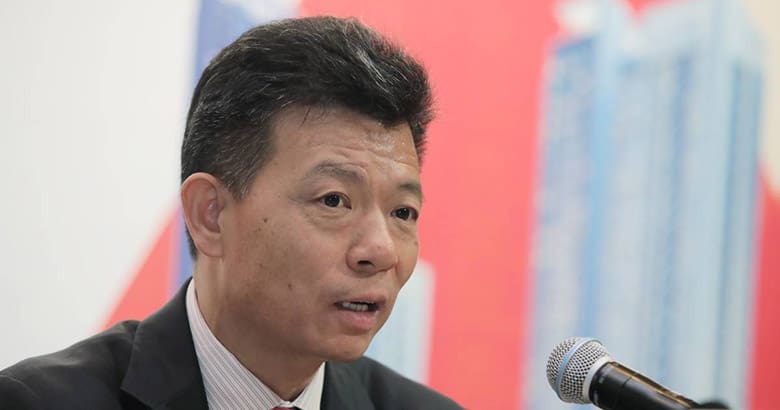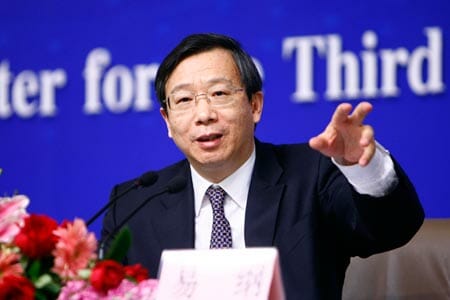
Kaisa chairman Kwok Ying Shing is facing a Tuesday debt deadline
Kaisa Group Holdings and China Aoyuan Group joined China Evergrande Group on center stage in China’s defaulting developer drama late this past week as all three Hong Kong-listed builders cautioned that default scenarios loomed.
“In light of the current liquidity status of the Group, there is no guarantee that the Group will have sufficient funds to continue to perform its financial obligations,” Evergrande said in a statement after markets closed on Friday. That same announcement revealed that the debt-addled developer had received an unspecified demand to fulfil a $260 million financial obligation.
Kaisa, which has been hustling to liquidate assets in recent weeks, had warned on Friday morning that, “There is no guarantee that the Company will be able to meet the repayment obligations under the Existing Notes at maturity,” after holders of a $400 million bond due on 7 December rejected a proposed swap for paper maturing in 2023.
China Aoyuan, which had missed a RMB 66 million ($10.3 million) payment on 12 November, announced on Thursday that its creditors are demanding repayment of $651.2 million in debt after a series of credit rating downgrades.
Send in the Working Group
In addition to the pressure that it is facing from creditors, China’s most indebted developer also came under fire from regulators on Friday.

PBOC chief Yi Gang blames Evergrande’s management
“The risks of Evergrande Group are mainly due to its own poor management and blind expansion,” The People’s Bank of China said in a statement published on its website late that day in response to the developer’s revelation that it might not be able to pay its debts.
China’s top financial regulator said that it supported a move by the government of Evergrande’s home province of Guangdong to resolve risks associated with the developer, after provincial authorities had said on Friday that they had summoned the developer’s chairman for discussions and had dispatched a working group to the company’s offices to help manage maintain stability.
When China HNA Group proved unable to manage its debts last year, the government of Hainan province, where the mainland conglomerate is based, had sent in a working group to take leadership roles in the company and accelerate asset sales. Early this year HNA declared bankruptcy and its chairman Chen Feng and chief executive Adam Tan were detained in September.
Kaisa Concerns
While no one from its management has been detained by the authorities recently, Kaisa is facing the spectre of a Tuesday default on its $400 million in bonds after the company had failed to convince holders of 95 percent of the notes by value to accept its 25 November offer of a swap for new bonds maturing 6 June 2023 at the same interest rate.
The Friday statement signed by chairman Kwok Ying Shing said that the developer is exploring all feasible solutions but admitted that, should it be “unable to repay the Existing Notes at its maturity or agree with its holders on alternative arrangements, it would have a material adverse effect on the Group’s financial condition.”
Just last month Kaisa had confirmed that it had failed to pay $88 million in interest due on offshore bonds, putting 18 projects in its home city worth RMB 81.8 billion ($12.8 billion) up for sale, according to Bloomberg.
The company’s latest warning of potential default came just over one week after Kaisa was revealed to be selling its stake in a Kai Tak residential plot in a deal valued at HK$7.9 billion ($1 billion), with the developer said to also be marketing other assets in Hong Kong.
During recent weeks the developer has suffered a series of downgrades from credit rating agencies, with Fitch on 16 November lowering Kaisa’s long-term foreign-currency issuer default rating from CCC- to C, due in part to its likely inability to pay bond interest.
Aoyuan on the Rocks
China Aoyuan was hit with its own downgrade on 16 November, with Fitch lowering the group’s Long-Term Foreign-Currency Issuer Default Rating from BB to B+ with the ratings agency noting that this reflected the developer’s “decreasing financial flexibility” amid volatile markets.
On Thursday the Guangzhou-based developer said that it had not yet made payment on the $651 million in principal demanded by its unnamed creditor, nor had it reached an agreement to find an alternative settlement.
Aoyuan warned that its failure to make payment on the debt could trigger acceleration of repayment demand from other creditors. In announcing its November downgrade, Fitch had indicated that one of the key drivers for the decision had been the developer’s estimated RMB 8.8 billion of debt maturing or becoming puttable through the end of 2022.
The builder has been attempting to liquidate assets and generate cash in recent days, with mainland media reporting on 1 December that Aoyuan is negotiating with potential buyers regarding the sale of an industrial conversion project in Hong Kong’s Kwai Chung area.
Just last month Aoyuan had sold a residential project in Hong Kong’s Mid-Levels for HK$900 million disposal of its 86.4 percent interest in a Mid-Levels residential property last month.
Other mainland developers have also been showing signs of pressure, with Fantasia Holdings Group saying on 24 November tha creditors had filed a winding-up petition against one of its entities in relation to a $149 million loan guaranteed by Fantasia Investment Holdings.
Leave a Reply